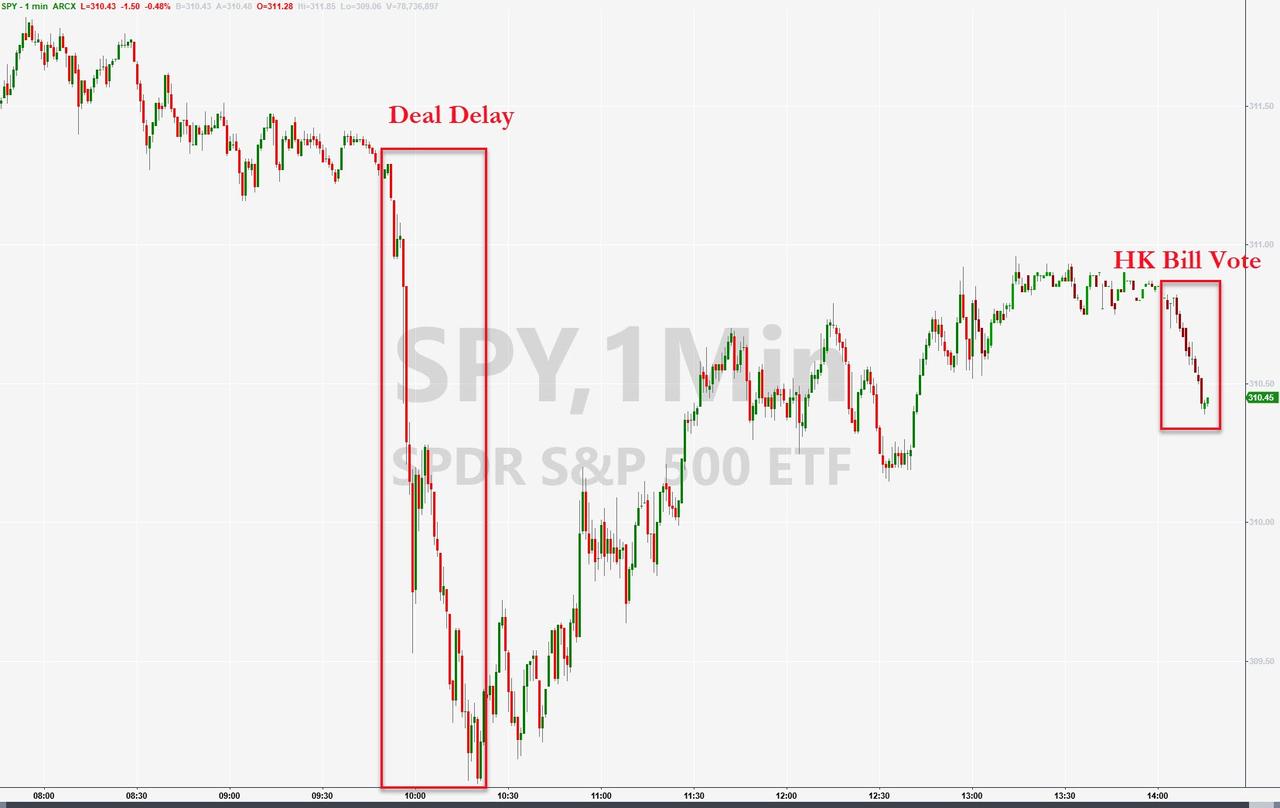In Landslide Vote, US House Joins Senate In Defying China, Backing Hong Kong Protesters
One day after the Senate unanimously passed a Bill backing Hong Kong’s pro-democracy protesters, and spawning a wave of complaints and threats from China which warned it would retaliate, moments ago the U.S. House of Representatives followed in the footsteps of the Senate, and in a nearly unanimous vote cleared legislation supporting pro-democracy protesters in Hong Kong by requiring an annual review of whether the city is sufficiently autonomous from Beijing to justify its special trading status, defying objections from China.
The bill, S. 1838, which would require annual reviews of Hong Kong’s special status under U.S. law and sanction officials deemed responsible for human rights abuses and undermining the city’s autonomy, passed the House 417-1 late on Wednesday afternoon setting up a confrontation with Beijing that could imperil a long-awaited trade deal between the world’s two largest economies.
The bill now goes to Trump as soon as Thursday to be vetoed or signed into law, according to a congressional aide.
While the White House declined to comment on whether Trump will sign the legislation, Trump’s position is now acutely precarious because Congress would easily be able to override any veto. If Trump signs the bill, he could torpedo the trade talks, while refusing to sign it would give his political opponents a chance to attack him for being weak on China, while at the same time facing an ongoing impeachment process.
“The Congress is sending an unmistakable message to the world that the United States stands in solidarity with freedom-loving people of Hong Kong and that we fully support their fight for freedom,” Speaker Nancy Pelosi said on the House floor. “This has been a very unifying issue for us.”
Trump has been silent as the Hong Kong protests escalated into violence in recent weeks, even as lawmakers of both parties demanded action on the measure. Chinese officials quickly responded to the bill’s Senate passage Tuesday, saying Beijing “firmly” opposes the congressional action, which it considers a grave violation of international law.
“We stand in solidarity with the people of Hong Kong,” said Republican Representative Chris Smith, who has been pushing the legislation since Hong Kong protests in 2014. “There will be strong sanctions, other ramifications for this crackdown.”
After dropping 24 hours ago when the Senate first passed the bill, US equity futures dipped modestly following news of the bill’s passage in the House.
Meanwhile, as markets keep an eye on what Trump will do now, they will also be looking at China’s response. As we reported earlier, the Global Times editor in chief Hu Xijin tweeted early on Wednesday that “China wants a deal but is prepared for the worst-case scenario, a prolonged trade war.”
Few Chinese believe that China and the US can reach a deal soon. Given current poor China policy of the US, people tend to believe the significance of a trade deal, if reached, will be limited. China wants a deal but is prepared for the worst-case scenario, a prolonged trade war. https://t.co/7KPp5cUOIQ
— Hu Xijin 胡锡进 (@HuXijin_GT) November 20, 2019
To be sure, any aggressive response by China to the bill’s passage will not only make the passage of any trade deal in 2019 impossible, but will likely lead to even more antagonism and escalation in the coming months, something which Trump has been eager to avoid with the presidential elections less than a year ago.
On the other hand, even though China’s Xi Jinping doesn’t have to worry about electoral pressure – as he recently crowned himself ruler for life – he also wants to stop the bleeding and avoid more tariff increases, including one still due to take place in December. And Xi may be under pressure within the Communist Party: A rare leak to the New York Times this week of internal documents showing human-rights abuses in Xinjiang signaled some dissent in China’s opaque political system.
Beijing has other options too: beyond merely delaying trade talks, it could hit out at U.S. companies (most notably Apple), halt cooperation on enforcing sanctions related to North Korea and Iran, recall the Chinese ambassador to the U.S. or downgrade diplomatic relations. It could also further tighten rare earth metal exports.
Yet according to many, the most likely outcome is that for all its huffing and puffing, China will do, well, nothing. After all, when it comes to Hong Kong, Trump already has enormous leverage, and as Bloomberg notes, under the Hong Kong Policy Act of 1992, the U.S. president can issue an order removing the special trading status that underpins its economy, potentially with devastating consequences.
And since Beijing realizes will only do that if extremely provoked, it is likely to limit itself to “very high-sounding, rhetorical responses” rather than concrete actions hitting American economic interests, according to Willy Lam, an adjunct professor at the Chinese University of Hong Kong’s Centre for China Studies, who has authored numerous books on Chinese politics.
“The Chinese will, of course, cry foul, but the real reaction may not be that severe,” Lam said. “They will watch the situation and make a judgment later.”
We’ll find out in the next several days if this take was correct.
Tyler Durden
Wed, 11/20/2019 – 17:28
via ZeroHedge News https://ift.tt/35irXcq Tyler Durden
